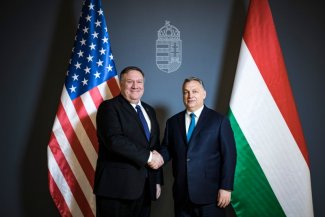Hungary’s response to the offer to improve US-Hungarian relations

On 11 February, the US Secretary of State Mike Pompeo travelled to Budapest as part of his trip to Europe. This was the first visit of a US Secretary of State to Hungary since 2011. Pompeo met with Prime Minister Viktor Orbán, the minister of Foreign Affairs and the minister of Defence. The main subjects of the talks were Hungarian-US relations, co-operation in the area of defence, energy security, support for Ukraine, and counteracting Russian and Chinese influence. Pompeo also met with representatives of non-governmental organisations, including the Helsinki Committee which has criticised the moves of the Fidesz-KDNP government on numerous occasions and is being attacked by the pro-government media. In contrast to the previous visit on this level, when Hillary Clinton was the Secretary of State, Pompeo did not meet with representatives of the opposition.
Commentary
- Hungarian-US relations have been very cold throughout the entire period of Fidesz’s government and the presidency of Barack Obama. The USA consistently criticised the undemocratic practices of the government in Budapest. Relations did not improve significantly when Donald Trump took power, even though his stance on migration and the activity of George Soros is similar to that of the Hungarian government, . This was especially due to the fact that Budapest continued its policy of ‘Eastern Opening’ envisaging close co-operation, especially along economic lines, with Moscow and Beijing. Prime Minister Premier Orbán on numerous occasions mentioned the need to adjust to geopolitical changes and to prepare the country for multi-vectorality in global politics. One example of these actions was the Hungarian government’s decision to surrender to Moscow the Russian arms dealers who had been detained in Hungary in co-operation with the USA. Furthermore, Orbán, regardless of his disputes with EU institutions, is presenting himself as a supporter of increasing the EU’s role as regards defence issues and the formation of European (EU) armed forces as an addition to NATO. In his opinion, EU member states have sufficient resources and technologies to become independent from US assistance in the area of defence but there is no political will to do this. Another point of dispute in US-Hungarian relations was Budapest’s policy towards the Central European University (CEU), which was ultimately forced to move its headquarters to Vienna. However, in this case Washington, besides criticism, did not take any other measures aimed at changing the Hungarian government’s policy towards the CEU and, in the broader context, Open Society Foundations. The US passiveness regarding this issue might be a result of the US Administration’s critical approach towards this organisation’s activity.
- Since David B. Cornstein was nominated US ambassador to Hungary in February 2018, Washington has been making efforts to improve relations with Budapest. Hungary is capitalising on this intensified interest from the USA and wants to gain us much from it as possible. The top priority for the USA at present is to restrict Russian and Chinese influence in Central Europe and to strengthen its own position in the region. The means employed to achieve this include the construction of a terminal which is able to receive US LNG (liquefied natural gas) on the Croatian island Krk, and the development of the Romanian-Hungarian gas pipeline. Given its location, Hungary plays a key role in the development of infrastructural connections in the region aimed at ensuring independence from Russian supplies. Hungary’s MOL also owns a 49% stake in Croatia’s largest oil and gas company INA. Budapest’s pro-Israeli policy, manifestations of which include good relations between the prime ministers Viktor Orbán and Benjamin Netanyahu and co-operation in the V4+Israel format, has also had a certain impact on the change in US policy towards Hungary.
- In exchange for actions that fit in with the implementation of its strategic goals, the USA is ready to reduce the pressure it is applying in the area of domestic policy. The US has recently softened its criticism of Budapest as regards the internal situation or law and order in the country. Another success of Hungary’s is gaining Washington’s understanding for its policy towards Ukraine, especially as regards the protection of minority rights in this country. In turn, Hungary made a gesture towards the USA by announcing that it is considering the offer of the US firm Raytheon in the process of buying a defence system. So far, the modernisation of the Hungarian armed forces has been based mainly on supplies from European weapon manufacturers (such as Airbus helicopters, Krauss-Maffei Wegmann tanks and self-propelled howitzers and Czech pistols and rifles).
- The manner in which the visit unfolded suggests that Hungary will still be manoeuvring and will continue its multi-vectoral policy. The Hungarian government has announced that it will carry on developing its close co-operation with Russia and China. It has not clearly withdrawn its support for the TurkStream project aimed at ensuring Russian gas supplies to Southern Europe, and it still criticises the concept of the LNG terminal construction on Krk as being economically unfeasible. The only compromise the two parties have reached concerns the renewal of the defence co-operation agreement (it will be considered by the relevant commission in the Hungarian parliament). The USA has made the implementation of the project covering infrastructure development at Kecskemét Airport, worth US$55 million, dependent on this agreement becoming effective. Pompeo’s visit has enabled the Hungarian government to emphasise its subjectivity and improve its position in negotiations with partners such as Russia and China. However, there are many facts suggesting that the USA will continue its pressure on Budapest to restrict Chinese and Russian investments in Hungary.




